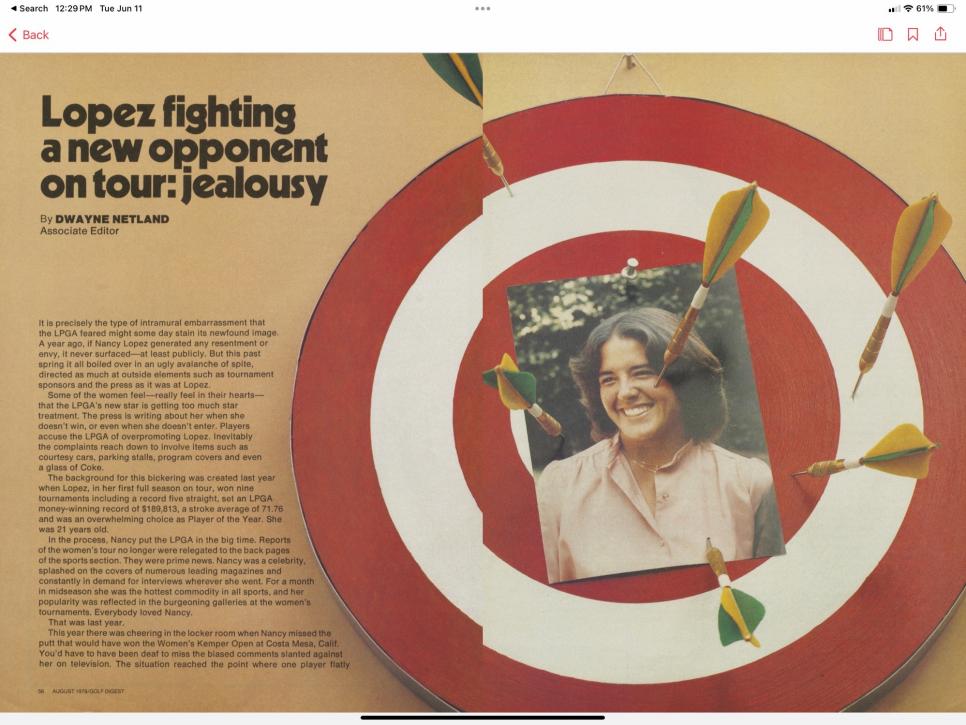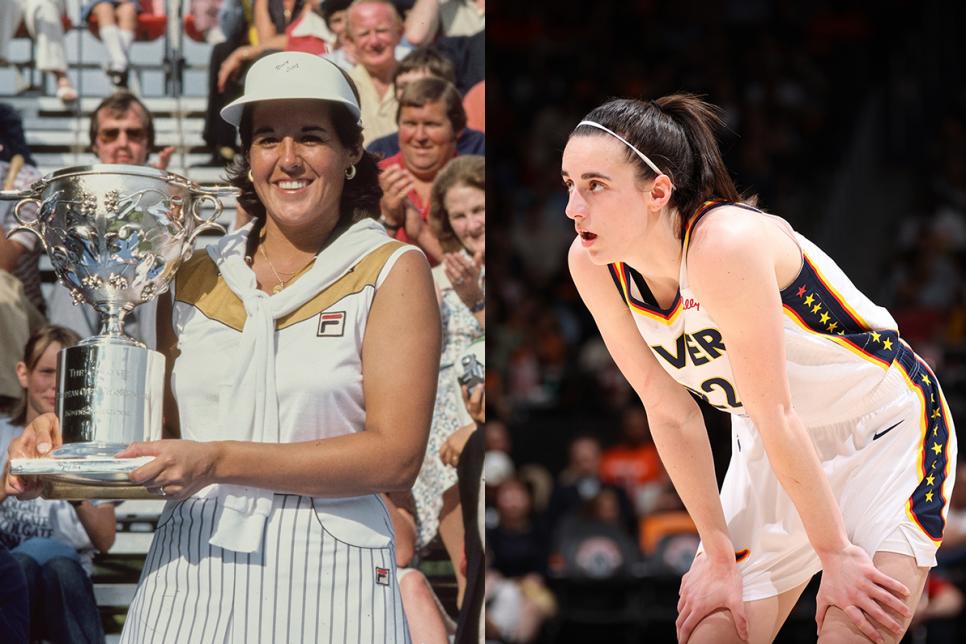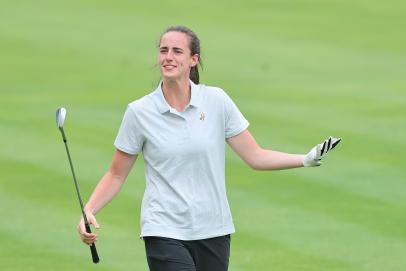Caitlin Clark reminds me of Nancy Lopez. They were instant winners. Their popularity transcended and lifted their sports. They’ve inspired both admiration and envy among their peers. And maybe most important: They share an indomitable spirit.
You know Caitlin’s story, but you may have forgotten Nancy’s. She won the USGA Girls' Junior at 15 and 17; tied for second in the Women’s Open at 18, turned pro at 20 and won nine tournaments in her first full year on the LPGA Tour, including five consecutively. Women’s golf had minimal media coverage until she put it on the front page.
I was just an intern at Golf Digest when she was a rookie. Almost half a century later I still couldn’t forget an article written by my colleague, Dwayne Netland, because of the illustration that accompanied it. The headline said, “Lopez Fighting a New Opponent on Tour: Jealousy,” but it was the image that lingered: A picture of Nancy on a dart board with darts piercing her face and left breast. It wasn’t as elegant as George Lois’ 1968 Esquire cover depicting Muhammad Ali as the third century Christian martyr St. Sebastian transfixed with arrows. But the image of an athlete under fire endures.

Nancy wasn’t banned like Ali or body-checked like Caitlin, but “there was cheering in the locker room” when she missed a putt to win a tournament and one player was even quoted as saying, “If Nancy broke a leg I don’t think any of us would care.”
Then LPGA Commissioner Ray Volpe said, “Nancy Lopez earned her dues on the leaderboard. She is a rare and gifted athlete with a charisma the galleries love. Her conduct on and off the course has been impeccable. But every athlete wants to be recognized, and here the egos become involved. Those egos don’t like to see one person become too successful, especially at their expense.” (Substitute Clark for Lopez.)
Australian athletes know it as the Tall Poppy Syndrome: when someone gets too successful, they are cut down to size. Even in cases when a superstar raises the financial rewards for an entire sport, there's what executive consultant Pat Heim calls the "power dead-even rule." It applies to all genders, but she says women in particular want to be "even" in rank and ability to other female professionals, and when one deviates in status, there's a long history of rejection. "Women are just tougher on women," a former WNBA executive told me.
Is it fair to ask female athletes to see the bigger picture? And to what extent are the men who ask them to see the bigger picture guilty of a double standard?
Hollis Stacy was quoted as saying all those years ago, “I know how it looks. It reflects badly on us. We don’t have anything against Nancy. She’s been great for the tour, but … It’s just that some of the rest of us have done pretty well, too. The recognition goes to Nancy. That’s not her fault, of course. But I think she could help herself by spending some time off the golf course with us. She comes and goes like a shadow. I don’t know her at all. I wonder if I ever will.”
Time changed all that. Lopez won another eight tournaments in her second full season, 48 in her career, and millions of fans along the way, including Hollis and the rest of her peers. There was a reaffirming scene at the World Golf Hall of Fame induction ceremony in Pinehurst this week. The founders of the LPGA were all inducted, none of them still alive, but the women pros who followed them celebrated their memory at a table in the after-party and laughed and cheered and told stories on each other, and Nancy spoke on stage in their behalf.
She didn’t remember the Golf Digest story, but I asked her if she felt any kinship with Caitlin today, and she nodded. “I just don’t understand why she was left off the Olympic team,” Nancy said. “The other stuff is human nature. People are jealous. They knock you down if you get too successful. Some of what I experienced was just because they didn’t know me. I’d go from the course to the press conferences and then to the practice range. By the time I got back to the locker room, everyone was gone, so it took a while for us to become friends.”
There's the added caveat that Clark may have audience and media pull, but she doesn’t yet have Lopez credentials. Arguing that Clark should be on the Olympic team when she's hardly one of the 12 best players is insulting to women's sports because it implies they shouldn't be as fiercely competitive as men. Still there's serious cause to celebrate Caitlin—and NBC Sports would kill to get her on the team.
Across the room at Pinehurst was the legendary sport psychologist Bob Rotella, whose first year on the staff of Golf Digest was also Nancy’s rookie year. “Her father Domingo ran an auto-body repair shop,” Rotella was saying now. “Somehow he taught her to play happy. I don’t know Caitlin, but I suspect she has parents who taught her to play happy, too. Because that’s what you see in the perspective they both bring to the game.”
I thought it sounded like advice right out of Rotella’s own playbook when Caitlin got knocked down by the Chicago Sky guard who doesn’t deserve to be named. When asked about the incident after her team won 71-70, Caitlin said, “I think it's just like, 'Respond, calm down, and let your play do the talking.'"
Isn’t that always the answer? Play happy. “It worked out pretty well for Nancy,” Rotella said. “I suspect Caitlin will do OK, too.”


